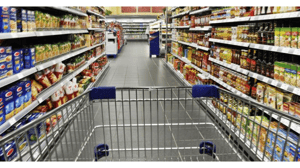Study: Absent an official recession declaration, some consumers are behaving like there is one
“When shoppers believe we are in a recession, they will behave as though we’re in a recession,” said Acosta Consumer Insights and Trends SVP Kathy Risch.
January 20, 2023

Despite a lack of consensus among economic experts, nearly half of shoppers believe the country is in a recession, according to research from sales and marketing services provider Acosta.
And that means consumers are changing the way they behave, Acosta found, based on the firm's November 2022 shopper insights survey. The research found an increase in recessionary consumer behaviors this year, as well as other ways shoppers are coping with inflation.
Of the consumers surveyed, 61% claim they are eating out less as more consumers are likely to cook a restaurant-quality meal at home, 63% are eating up as much food as they have on hand before buying more, 52% are spending less on entertainment, 67% are spending less on items like clothing, and 46% are saving less.
“The economic challenges of the past year will continue to impact consumer behavior in 2023, providing overarching context for what shoppers most care about and how they want to shop,” said Kathy Risch, SVP, Consumer Insights and Trends at Acosta in a statement.

Photo courtesy: Shutterstock
While these trade-down/trade-out behaviors may have negative implications, some categories may actually benefit, said an Acosta news release. Research shows that chocolate sales are stronger than ever with Hershey, Hostess and Mondelez seeing profits, as consumers seek affordable indulgences, such as snacks, to cope with these inflationary times.
Twenty-five percent of shoppers indicated that they are snacking more than usual, and indulging in comfort foods. Purchasing health and beauty products is another coping strategy that consumers are using as a way to treat themselves by looking good even if they don’t feel good, said Acosta. Known as the “lipstick effect”—a behavior in recessionary times when shoppers splurge on makeup, including lipstick, according to Acosta—the company predicts that health and beauty may see a growth in sales this year.

Photo courtesy: Shutterstock
“When shoppers believe we are in a recession, they will behave as though we’re in a recession,” said Risch. “They are doing less, trading down, practicing smart, conservative and creative behaviors that are likely to last.”
Acosta also shared some other 2023 predictions such as: more big box stores opening smaller formats; traditionally online-only retailers opening stores; shopping becoming more connected as 5G adoption in retail stores is set to triple by 2024; and a continued transformation into the “new hybrid world,” as customers expect brands and retailers to adapt to this “new normal.”
“We foresee continued impact from economic challenges as consumers are heightening their expectations for personalized, hybrid and omnichannel shopping, and their redefined focus on wellness for themselves, others and the planet,” said Risch, concluding that brands and retailers will need to continue to make significant shifts in how they provide value, quality, entertainment, service and convenience to shoppers in 2023.
About the Author
You May Also Like




